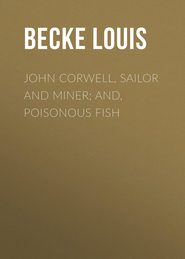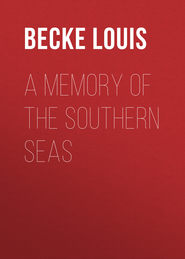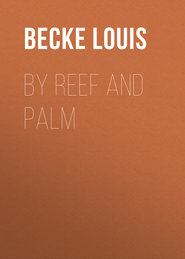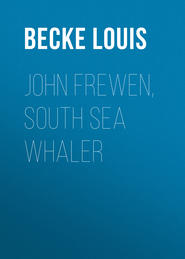По всем вопросам обращайтесь на: info@litportal.ru
(©) 2003-2024.
✖
Rídan The Devil And Other Stories
Настройки чтения
Размер шрифта
Высота строк
Поля
Soon after breakfast next morning, Patrick Kenna, under pretence of speaking to my mother about a strayed heifer of ours, came into the kitchen, and told Ruth that all was well; he had been to Little Nobby’s at daylight and found that everything was gone and the boat was nowhere to be discerned.
For quite another two or three weeks after this the constables pursued their search after Thomas May, much to the amusement of Ruth and Patrick Kenna, especially as the latter, with ‘King Billy’ and another aboriginal, were officially employed by my father at ten shillings per diem to discover the absconder—Billy, who seemed to be most anxious to get the reward of five pounds, leading the constables all over the country and eating more than three men’s rations daily. At last the chase was abandoned, and my father wrote officially to Sydney and said that ‘Thomas May, No. 3614, Breckenbridge,’ was supposed to have either died of starvation in the bush or have been killed by the natives. My mother, of course, thought she knew better.
And so the matter was forgotten by everyone but us who had known and cared for the good-natured, high-spirited and warm-hearted young sailor; and as the months went by, Walter Trenfield and my mother both looked forward to receiving a letter from Tom May, telling them that he and his companions had reached some port in the Dutch East Indies in safety. For not only was the boat well found, but they had plenty of provisions, and Tom May was a thorough seaman; and besides that, my mother had often told us the story of the convict William Bryant, who had escaped from Sydney Harbour in Governor Phillip’s time, and in an open boat, with four other men and his wife and two infant children, succeeded in reaching Timor, after a voyage of three thousand miles.[6 - Publisher’s Note.—The strange but true story of the Bryants is told in a volume entitled A First Fleet Family. (Louis Becke and Walter Jeffery. London: T. Fisher Unwin. 1896.)]
But no letter came until two long years had passed.
Ruth Kenna, at the time of my story, though not yet seventeen years of age, was a tall, powerful girl, and was known as the best horsewoman in all the country around. She was a happy, good-natured sort of a wench, with a heart filled with sunshine and love and truth and honesty; though Mr Sampson once told my father that she was a ‘dangerous Papist,’ and the child of a convicted rebel, and as such should have no place in a Protestant family. This so angered my mother that she wrote the clergyman a very sharp letter and said she would take it as a favour if he would not interfere with her servants. This was a great thing for her to do; and my father said ‘twas most indiscreet. But mother only smiled and said that although she was sorry Ruth was a Papist, she (Ruth) was a good, honest girl, and that her father was a good, honest man, and that if Mr Sampson was wise he would not come near Ruth, who, being a free woman, had said she would throw him down the garden well. At this time Ruth was looking forward to the day of her marriage with Trenfield, who, through my father’s influence with the Governor, was expecting to be pardoned.
But now I am forging ahead too fast, and must go back to where we boys and Walter Trenfield were lying on the grassy bluff overlooking Little Nobby’s awaiting the return of my brother Harry.
CHAPTER III
‘Walter,’ said Harry, throwing down the pigeon which he had shot, and pointing to Little Nobby’s, ‘this is the lowest tide I have ever seen. Look, the topmost fringe of kelp on the rocks is quite dry, and six feet above the water, and there is no surf. Let’s swim across the gut into the cave.’
‘As you please, sir,’ the young man answered, his sun-tanned face lighting up with pleasure; ‘the wind is westerly, and the water very clear; so, if there are any sharks about we can easily see them.’
So presently down we trooped, and, clambering over the jagged pinnacles of rock, soon reached the seaward face of Little Nobby’s. The cave of which my brother had spoken was in the very centre of the cone, and the only known way of access to it was by swimming across the narrow gut or channel which cleft in twain the base of the hill. A boat, in calm weather, might have easily rowed up to the mouth of the cave, but only during a very low tide. No one, so far, had attempted this, and ‘King Billy,’ when he saw my brother and Trenfield strip and jump into the water, seemed much disturbed. The cave, he said, was the home of a ‘debbil-debbil,’ and ‘twas dangerous for any human being to enter it. But Harry and Trenfield had already swum across, clambered up the kelp-covered ledge of the cave and disappeared into the darkness beyond.
For nearly ten minutes, or perhaps a quarter of an hour, Will and I waited impatiently for their return, grumbling at not being allowed to go with them, for the sea was as smooth as a mountain lake, and the water so clear that the smallest pebble could be discerned lying upon the white sandy bottom five fathoms below.
Said Will presently, ‘I don’t believe there’s a shark within a mile; do you?’
‘No,’ I answered, looking longingly at the crystal water and then at the black mouth of the cavern, which neither Will nor I had ever entered.
‘Then come on,’ said Will, quickly, and in a few seconds we were out of our clothes, and paying no heed to ‘King Billy’s’ exclamations of terror we dropped quietly into the water and swam across, telling him to stay where he was and keep a look-out for sharks.
A few strokes brought us safely over, and then, as we climbed up and stood on the cold rocky floor of the dark cave, our hearts began to fail us somewhat—the place was so grim, silent and terrifying.
Feeling our way carefully along, however, we advanced for some ten or twelve yards and then stopped, for though we heard the voices, we could see the figures of Harry and Trenfield but dimly.
‘Where are you?’ cried Will.
‘Over here,’ answered my brother; ‘you can come along if you like. We think that there’s a way of getting out by climbing up—we can see the trees on the back of the hill.’
This was a discovery indeed, and Will and I, as we made our way to where they sat, found the darkness decreasing at every step, and when we reached them, we could see about us quite plainly, for thin, dimmed shafts of sunlight penetrated the cavern from above by a narrow cleft, through which we could see not only the dark foliage of the trees, whose branches overhung the place, but a strip of blue sky.
‘Listen!’ said Will.
Somewhere near a ‘butcher’ bird was calling to its mate, who quickly answered, and then the pair whistled sweetly and joyously together; and when they ceased a bell-bird sounded his clear, resonant note thrice—then silence.
Presently Walter and Harry set about to attempt an ascent, laughing heartily at the thought of how we should startle poor ‘King Billy’ by reappearing out of the bowels of the earth, instead of by the way we had left him.
The top of the cleft was not more than thirty feet from the floor of the cave, and its very narrowness reduced the difficulty of climbing up its rugged sides, which were composed of pieces of rock embedded in earth. In the centre, however, the walls approached so closely to each other about half way down—within a few inches, in fact—that they were blocked up with what appeared to be a mass of decaying branches, fallen leaves and such débris.
Walter Trenfield went first, then Will, and Harry and I followed. We found it much easier working our way up than we anticipated, for the jutting points of rock gave us a good foothold, and the roots of trees, living and dead, helped us greatly, for some of these grew across from one side of the cleft to the other, and afforded us ladder-like steps.
Walter had nearly reached the mouth of the chasm, when Will, who was ascending more leisurely and carefully behind him, put his foot upon the thick mass of leaves and rotting wood which blocked up its centre, and, finding it was firm, sat down upon it to rest himself. Presently, to have some amusement at the expense of Harry and myself, who were directly beneath him, he began to shower armfuls of dead leaves upon us—then suddenly he uttered a cry of terror, sprang to his feet, and clambered quickly to the top, where Trenfield seized him just as he was about to fall.
Thinking that he had been frightened, or perhaps bitten by a black snake or a death-adder, Harry and I climbed up after him as quickly as possible, little heeding the cuts and bruises we inflicted upon our naked bodies. As soon as we reached the ledge and flung ourselves, panting and somewhat terrified, on the thick bed of leaves which covered the ground like a carpet, we saw Walter Trenfield bending his tall, naked figure over Will, who was crouched up in a heap and trying, through his sobs of terror, to tell what it was that he had seen.
‘There is a dead man down there,’ he gasped, ‘a dead man! When I took up the last armful of leaves to throw down on Tom and Harry, I saw a dreadful face beneath… it was almost a skull, but there is some flesh on the face… and oh, Walter! it has red hair like Tom May’s.’ Then, overcome by the terror of that which he had seen, he sobbed afresh.
‘Come,’ sir,’ said Trenfield to my eldest brother, ‘we must go down and look.’
Leaning over the brink of the narrow cleft, I watched Harry and Trenfield descend, throw down the rotting leaves and timber which had accumulated in the centre; and then I saw a dreadful sight—a shrunken, awful face, with white, gleaming teeth, and two fleshless hands lying together upon an all but skeleton chest. The rest of the body, except one leg, which from the knee downwards was partly raised and showed a bone protruding from a rough raw-hide boot, was mercifully concealed from our sight by the coarse jumper and grey canvas trousers of a convict.
Presently Walter looked up, and cried out in a strange, hoarse voice,—
‘Go away, Master Tom, you must not look. Do you and Master Will wait for us on the rocks, but first tell Billy to come here with our clothes.’
Will and I at once obeyed, glad to get away, and hurrying round the base of the hill we returned to ‘King Billy,’ who, poor simple savage, had given us up for lost, and was crouched up in a-heap on the rocks, making a low whining noise like the cry of a very young puppy. He did truly dance for joy when he heard our voices, and then at once, without asking us what had happened, went off to Walter and Harry, taking their clothes with him.
Will and I dressed ourselves, and then we sat down to wait.
‘Tom,’ said Will, who had now recovered his composure, ‘I am sure it is poor Tom May who is lying there. Do you remember a red silk handkerchief which mother gave him last Christmas Day? Well, there is one exactly like it round its neck. I was too frightened to look closer, but Tom always wore his handkerchief round his neck in a sailor’s knot. And then, too,’ and here Will’s eyes filled with tears and he began to sob, ‘it had bright red hair… it had nearly all fallen off, and…’
‘Oh, Will,’ I cried, ‘don’t tell me any more! I feel so sick.’
Nearly half an hour passed, and then we saw Harry and Trenfield, holding each other’s hand like two children, coming towards us. They sat down near us, and then the young convict placed his big, brown hands over his face, and heavy sobs broke from his broad chest.
‘Oh, God! Master Harry!’ he cried, ‘is there no justice in the world? To die there, in that awful place, like a rat in a trap! oh, it is dreadful, dreadful! And then I thought that he was long ago far away from here—a free man.’
‘Do you think those two other men threw him down there, Walter?’ asked my eldest brother, almost in a whisper.
‘No, sir,’ he replied, catching his breath. ‘Why should they murder the man who alone was capable of taking the boat upon such a long voyage? This is what I think, sir. Poor Tom, instead of coming down in the boat with the other two, left them on Saturday and walked here so that he might light a fire on the top of Little Nobby’s on Sunday night to guide them to the place. He told Ruth’s father that he thought he should do this in case the night turned out very dark. And Billy says that a fire was made, and that when poor Tom was descending the hill to meet the boat he fell into the cleft and got jammed between the rocky walls.’
‘But would not the two other men make a search for him?’
‘God knows, sir! We shall never know. They may have thought that Tom had been captured, and that the fire had been lit by Ruth’s father. But I think that Billy is right, and that poor Tom, after lighting the fire, was coming down the hill to meet the boat, when in the darkness he wandered off the track and stepped into the crack at the widest part of its mouth, which is right above where we found him. He must have fallen upon his back and become so tightly wedged in in that awful place that he could not use his arms to free himself. And then, sir, even if he had not been stunned, his cries could not have been heard by the other two men, who, unless they purposely made a search, would not have had any reason to go within two hundred yards of the spot where he fell.’
Harry shuddered, and then for some time no one of us spoke. ‘King Billy’ had been sent off to tell my father of the discovery of the body, or rather skeleton, which Walter and Harry had at first attempted to free from the walls of the chasm, but were too overcome to complete the task.
Together we slowly ascended the bluff, and there a surprise awaited us; for, sitting on their horses, on the brow of the hill, were the dreaded minister and his convict orderly. They had no doubt seen our bags and guns lying on the grass, and had ridden to the crest of the bluff to discover our whereabouts.
Mr Sampson eyed us all very sourly, and scarcely deigned to respond to our salutations, as one by one we walked past him and busied ourselves in silence over our impedimenta. No doubt he saw that both Harry and Walter were very pale, and that Will and I had not yet dried our tears.
‘Come here, boys,’ he said in his harsh, pompous tones. ‘What, may I ask, is the cause of this grief which seems to be shared by all alike?’ Then, without waiting for an answer, his glance fell upon Walter Trenfield, who, after saluting him, had turned away, and with averted face was strapping some of our belongings together.
I saw the clergyman’s coarse red face, with its fat, terraced chins, grow purple with rage as I had seen it once before, and I instinctively drew back.
‘Ha!’ he said, and urging his horse forward, he bent down and touched the young convict on the shoulder with his whip. ‘Ha! look up, fellow. I want a word with you, sirrah.’
Trenfield, who was stooping at the moment, stood erect, and then, facing the parson, again raised his hand to his cap. His face was deadly pale, and his deep-set bright blue eyes seemed to have suddenly shrunken and drawn back, and his whole body was trembling.
‘Look at me, fellow,’ said Mr Sampson, for the second time.
‘I am looking at you, sir.’











